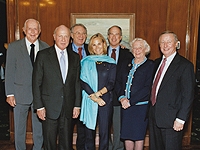
From left: NewYork Weill Cornell Council Life Member Frank Markoe Jr.; Life Member Sanford Ehrenkranz; Dr. Herbert Pardes, CEO and president of NewYork-Presbyterian Hospital; Barbara Liberman; Life Member Robert Liberman; Life Member Jean Lawson Stone; and Dr. Antonio Gotto, dean of the Medical College.
More than 90 members of the NewYork Weill Cornell Council and their guests met on Sept. 26 at the Griffis Faculty Club, to hear about new initiatives in cardiac care.
Jeffrey Greenberg, chairman of the NewYork Weill Cornell Council; Dr. Antonio Gotto, dean of the Medical College; and Dr. Herbert Pardes, CEO and president of NewYork-Presbyterian Hospital, gave the introductory remarks.
Dr. Pardes described the evening as a "celebration of the wonderful trajectory that the Medical Center is on." He referenced upcoming advances in patient care aimed to ensure that the Center's technology and facilities "match the lustrous greatness of the faculty and clinical programs."
Guest speakers were Dr. Holly Andersen, assistant professor of medicine, and Dr. Charles Mack, assistant professor of cardiothoracic surgery and director of the Programs for Robotic Cardiac Surgery and Surgical Arrhythmia at NewYork Weill Cornell Medical Center.
Dr. Andersen's presentation focused on the latest trends in treatment and prevention of cardiovascular disease in women. She reviewed risk factors for cardiovascular disease, including the need to reduce hypertension and cholesterol levels, stressing the benefits of cholesterol-lowering statin drugs for cardiac disease prevention. Dr. Andersen also discussed a number of preventive measures women can take, including abstaining from smoking, controlling diabetes and weight gain, and working physical activities, such as walking and climbing stairs, into every day.
Dr. Mack discussed the latest technological developments in robotically assisted cardiac surgery, explaining the potential of robotics for expanding minimally invasive surgery to enhance the surgeon's clinical capabilities and to improve the patient outcome. Compared to traditional bypass surgery, which may lead to a lengthy and painful recuperation, robotic bypass surgery has the potential to leave the patient with only a tiny scar, and yields a much faster and less painful recovery time.
NewYork Weill Cornell Medical Center is one of 12 institutions throughout the United States involved in ongoing Food and Drug Administration clinical trials to explore the use and effectiveness of robotics in cardiac surgery. Dr. Mack sees a future beyond treatment for diseases of the heart. "As robotics become more widespread, more interdisciplinary efforts, like those here at Weill Cornell, will continue to develop," he said.
During the event, Mr. Greenberg made a special presentation honoring newly appointed Life Members of the Council for their exceptional and long-standing dedication to the Medical Center. Newly inducted Life Members of the NewYork Weill Cornell Council are Phyllis Collins, Sanford Ehrenkranz, Robert Liberman, Frank Markoe Jr., Jean Lawson Stone, Wilbur and Frances Friedman, Annette de la Renta and Dorothy Sarnoff Raymond.
The next Council presentation will be held on Nov. 7. For more information, contact Chris Hanway at (212) 821-0527 or cnh2001@med.cornell.edu.

